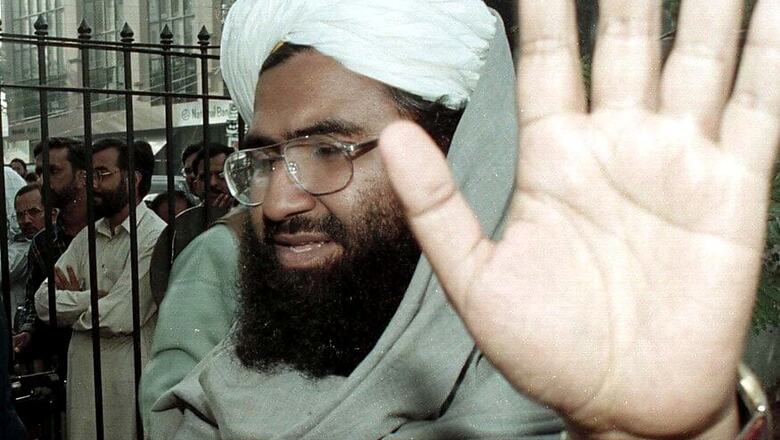
views
What pushed China in the last few weeks that it agreed to blacklist Masood Azhar, something it had successfully resisted for the last one decade? This is a question that many have on their mind. A sequence of events over the last few weeks pieced together with information gathered from various sources will put the picture in perspective.
On March 13, China had put a technical hold for the fourth time on a proposal to sanction Azhar as a global terrorist in the UNSC 1267 sanctions committee. This proposal was backed by the US, UK and France.
While all the three players had a critical role in persistently engaging with China as India continued to provide all evidence possible against the Jaish-e-Mohammad chief, sources point out but for the pressure built by the US, bringing Beijing on board would not have been possible.
Till the evening of March 13, there was cautious optimism in the diplomatic circles that post the dastardly Pulwama terror attack, China would not hold the listing this time.
The flicker of hope was stemming from the fact that most UNSC countries were supporting the proposal - it later emerged that 14 out of 15 countries had backed the proposal. Till the evening of 13th, a source said the feeling was that it may happen as the Chinese would not want to be seen as "pariah".
However, within hours, a little before midnight in India, China again placed a technical hold. With this, Beijing bought six months at the UNSC over the issue of Azhar. But it was clear that the US was getting impatient and not willing to wait any longer.
Within two weeks, before the month ended, the US made its intentions clear of pushing a resolution directly in the UNSC with UK and France’s backing. Sources believe it was this threat of a resolution that would entail on-record objections and voting that turned the discussion in favour of the listing in the sanctions committee.
A source also pointed out that in the intervening period, calls went from Washington DC to Beijing but when it did not relent, the route of a draft resolution was used for the first time ever in this matter. Beijing had reacted sharply to this move, with its foreign ministry spokesperson saying, "We urge the US to act cautiously and avoid forcefully moving forward this draft resolution."
While a proposal in the 1267 sanctions committee works on consensus - a resolution needs to be passed by nine members but should not be vetoed by a permanent member. Using a veto would have left China totally exposed as a country going to lengths to support a terrorist and also as a ‘P5’ member of the UNSC, a body that is meant to maintain peace and security, would have reflected very badly on it.
By mid-April, at least on two occasions, a source pointed out that US was willing to wait on the resolution a bit longer. This gave an indication that the talks were now headed in the right direction and a resolution may not be required at all.
It is learnt that finally a technical procedure called silence procedure was adopted which gives members a stipulated period of one or two weeks to object otherwise the proposal would be considered passed. The deadline for this was May 1, 9am New York time.
Meanwhile, before this deadline ended, foreign secretary Vijay Gokhale made a visit to Beijing on April 22. The visit was described as one for regular diplomatic consultations between India and China. He met the Executive Vice Foreign Minister, Le Yucheng, and Vice Foreign Minister, Kong Xuanyou.
When asked about a discussion on Azhar, the MEA spokesperson said, "We have shared with China all evidences of terrorist activities of Jaish-e-Mohammad and its leader Masood Azhar. It is now for the 1267 Sanctions Committee and other authorized bodies of the U.N. to take a decision on the listing of Masood Azhar. India will continue to pursue all available avenues to ensure that terrorist leaders who are involved in heinous attacks on our citizens are brought to justice."
Amidst all this, the announcement from US of the discontinuation of the US waiver to India on import of Iranian oil was made. A source pointed out that US was helping India on the listing of Masood Azhar with the expectation that India will also stand by US on what it believes is a measure to stamp out terror in Iran, indicating a quid pro quo.
With the Iran waiver exemption deadline being May 2, the matter was pushed so that it concluded successfully before that.
Finally, last Friday the British High Commissioner to India, Sir Dominic Asquith, virtually spelt it out that the issue will conclude shortly when he said, "We are waiting to see if the country that has been blocking it will lift objections. We have been strong supporters of the listing. We hope to get that conclusion shortly."
With this it became amply clear that the pressure coupled with sustained dialogue was getting China around.
It appears though that China bargained hard to ensure no mention of the Pulwama terror attack or Kashmir in the mentioned reasons for the listing of Masood Azhar, but sources continue to maintain that the listing has happened based on a pile of evidence including Pulwama.
With this, India's decade-long fight, which saw it being a lone proposer in 2009 to blacklist Masood Azhar to 2019, when a consensus has finally been arrived at, has culminated in a success.




















Comments
0 comment